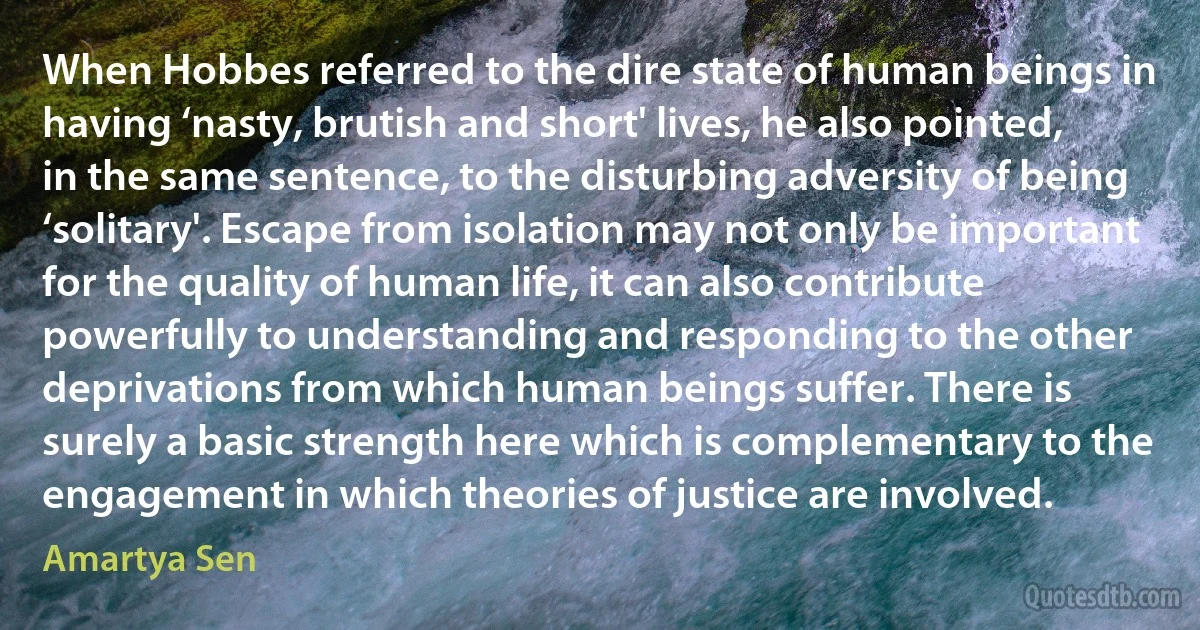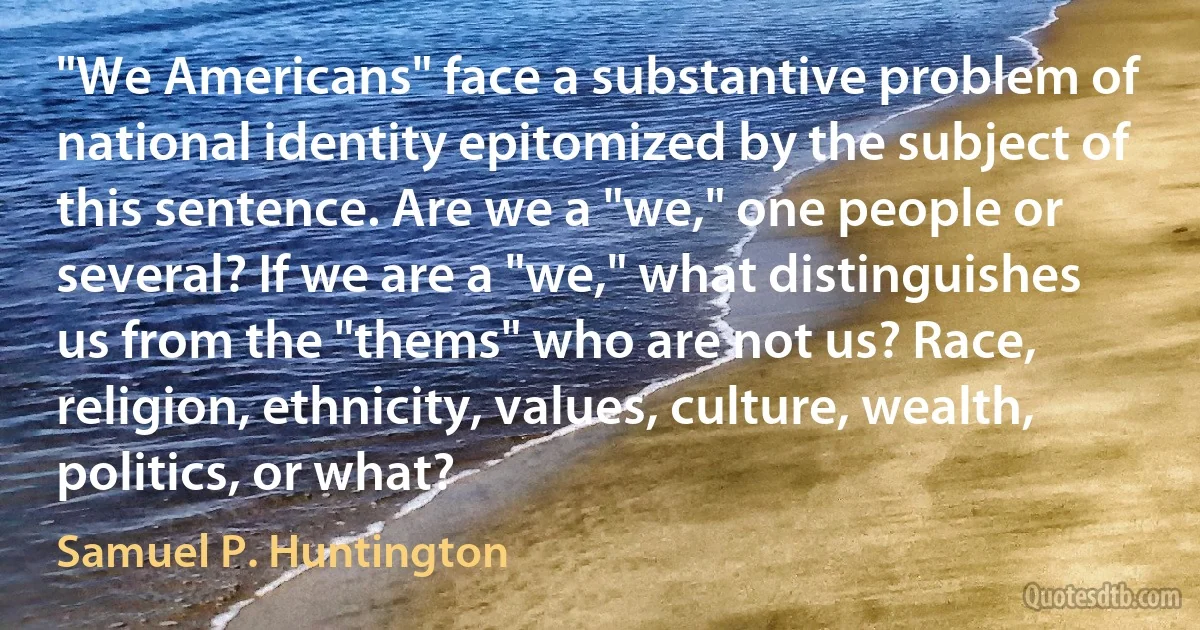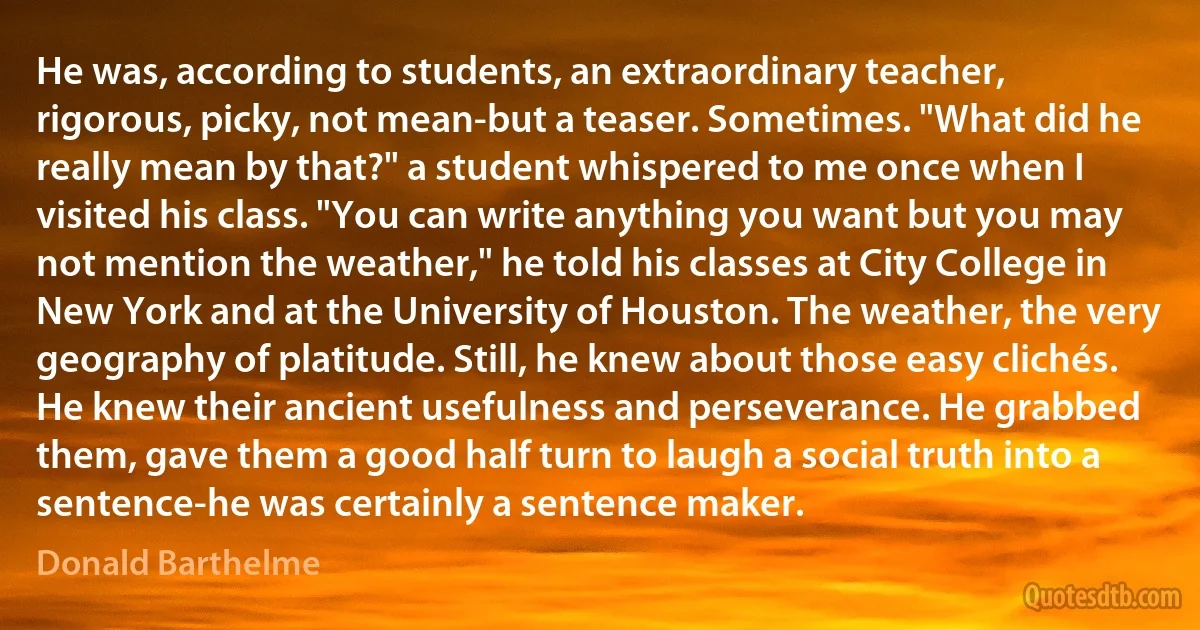Sentence Quotes - page 27
Senator Kennedy began his career setting a high standard when it comes to birthdays. It was when he reached the minimum constitutional age, 30, that he first came to the Senate--1 of just 16 Senators elected at such a tender age from a total of over 1,895 Senators in all of American history. By his 70th birthday he was one of just 28 Senators to ever cast over 10,000 votes. But what we celebrate along with Ted at 75--Democrats and Republicans, all in awe of a lifetime of achievement--is the way in which literally every year since he has been marking the passage of time by passing landmark legislation. The Boston Globe put it best, writing not long ago that "in actual, measurable impact on the lives of tens of millions of working families, the elderly, and the needy, Ted belongs in the same sentence with Franklin Roosevelt."

Ted Kennedy
Carnap made a detailed analysis of Heidegger's statement, "Nothing nihilates,” in order to show that it is purely verbal, devoid of empirical meaning. (Incidentally, this is the only sentence from existentialist philosophy the majority of contemporary positivists appear familiar with.)

Leszek Kołakowski
I made true the first English sentence [Albers came from Germany] that I uttered (better stuttered) on our arrival at Black Mountain College in November 1933 [right after the closing of the Bauhaus art school in Dessau Germany, by the Nazi's] When a student asked me what I was going to teach I said: 'to open eyes'. And this has become the motto of all my teaching [famous pupils of Josef Albers at Black Mountain College were for instance the young generation starting American artists, like Robert Rauschenberg, Helen Frankenthaler, Cy Twombly, Ray Johnson and Susan Weil.

Josef Albers
Origen understood it well, having been a pupil of Ammonius Saccas; therefore we see him bravely denying the perpetuity of hell-torments. He maintains that not only men, but even devils (by which term he meant disembodied human sinners), after a certain duration of punishment shall be pardoned and finally restored to heaven. ("De Civit. Dei," I, xxi., c. 17.) In consequence of this and other such heresies Origen was, as a matter of course, exiled. (p. 705)
Origen, Clemens Alexandrinus, Chalcidius, Methodius, and Maimonides, on the authority of the Targum of Jerusalem, the orthodox and greatest authority of the Jews, held that the first two words in the book of Genesis--B-RASIT, mean Wisdom, or the Principle. And that the idea of these words meaning "in the beginning" was never shared but by the profane, who were not allowed to penetrate any deeper into the esoteric sense of the sentence. (p. 727)

Origen
In 1984, the government spent zero dollars on AIDS research, because AIDS was thought to be a death sentence, and the virus was far too complicated to deal with. Today, the government spends annually $1.8 billion a year on research, and people who would have been dead four or five years ago now have the virus virtually undetectable in their bloodstream, and they're living normal lives.
That was something thought impossible until we put money and talent together and aimed it toward a problem.

Christopher Reeve
And do you not know that you are (each) an Eve? The sentence of God on this sex of yours lives in this age: the guilt must of necessity live too. You are the devil's gateway: you are the unsealer of that (forbidden) tree: you are the first deserter of the divine law: you are she who persuaded him whom the devil was not valiant enough to attack. You destroyed so easily God's image, man. On account of your desert-that is, death-even the Son of God had to die.

Tertullian
Sir, the hon. Gentleman has stated here very emphatically, what he has more than once stated at the conferences of the Anti-Corn-law League, that he holds me individually-[Great excitement]-individually responsible for the distress and suffering of the country; that he holds me personally responsible; but be the consequences of those insinuations what they may, never will I be influenced by menaces either in this House or out of this House, to adopt a course which I consider-[The rest of the sentence was lost in shouts from various parts of the House.].

Robert Peel
Paradis, possessed by his notion, waved his hand towards the wide unspeakable landscape. and looking steadily on it repeated his sentence, 'War is that. It is that everywhere. What are we, we chaps, and what's all this here? Nothing at all. All we can see is only a speck. You've got to remember that this morning there's three thousand kilometers of equal evils, or nearly equal, or worse."
"And then," said the comrade at our side, whom we could not recognize even by his voice, "to-morrow it begins again. It began again the day before yesterday, and all the days before that!"

Henri Barbusse
Once, bowed in the evening light, the dead man had said, "After my death, life will continue. Every detail in the world will continue to occupy the same place quietly. All the traces of my passing will die little by little, and the void I leave behind will be filled once more."
He was mistaken in saying so. He carried all the truth with him. Yet we, we saw him die. He was dead for us, but not for himself. I feel there is a fearfully difficult truth here which we must get, a formidable contradiction. But I hold on to the two ends of it, groping to find out what formless language will translate it. Something like this: "Every human being is the whole truth." I return to what I heard. We do not die since we are alone. It is the others who die. And this sentence, which comes to my lips tremulously, at once baleful and beaming with light, announces that death is a false god.

Henri Barbusse
It's really hard to talk about morality and war in the same sentence. In a war, there are so many questionable things done. Where was the morality in the bombing of Coventry, or the bombing of Dresden, or the Bataan Death March, or the Rape of Nanking, or the bombing of Pearl Harbor? I believe that when you're in a war, a nation must have the courage to do what it must to win the war with a minimum loss of lives.

Mike Jones
Eraserhead is my most spiritual movie. No one understands when I say that, but it is.
Eraserhead was growing in a certain way, and I didn't know what it meant. I was looking for a key to unlock what these sequences were saying. Of course, I understood some of it; but I didn't know the thing that just pulled it all together. And it was a struggle. So I got out my Bible and I started reading. And one day, I read a sentence. And I closed the Bible, because that was it. And then I saw the thing as a whole. And it fulfilled this vision for me, 100 percent.
I don't think I'll ever say what that sentence was.

David Lynch
With its extreme dependence on foreign aid, Bangladesh is understandably concerned about not offending Western sensibilities too much., Its government did not insist on implementing the prison sentence pronounced by a court against feminist author Taslima Nasrin for her 1994 book Shame, much less the death sentence pronounced by individual Muftis. Instead it preferred to send her into exile and be rid of the whole controversy. Her latest book, Wild Wind, is the object of yet another ban by the Islamist-leaning government of Khaleda Zia, the reason given being that it "destroys the socio-political amity of the country” and "contains anti-Islamic statements.”.

Taslima Nasrin
The reason I got [Seinfeld] is: my manager, George Shapiro, wrote a note to Brandon Tartikoff, the President of NBC, and it was one sentence; he said "Call me a crazy guy, but I think some day Jerry Seinfeld's gonna be doing a series on NBC." Now, when he wrote that note, it was... 1988. I had been on The Tonight Show for seven years -- three times a year -- destroying. [...] And George still [had] to say to NBC "I know this sounds crazy...". I thought of this just the other week: "What was so crazy about the idea?"

Jerry Seinfeld
The criterion which we use to test the genuineness of apparent statements of fact is the criterion of verifiability. We say that a sentence is factually significant to any given person, if, and only if, he knows how to verify the proposition which it purports to express - that is, if he knows what observations would lead him, under certain conditions, to accept the proposition as being true, or reject it as being false.

Alfred Jules Ayer
I sit in a London pub with Willie Maugham. I am distressed, because my first novel, Proud Emetic, has been coolly received by the critics. Its one favorable notice, in the Times, was vitiated by the last sentence, which called the book "a miasma of asinine cliches unrivalled in Western letters." Maugham explains that while this quote can be interpreted many ways, it might be best not to use it in the print ads.

Woody Allen
I try to write every day. I used to try to write four times a day, minimum of three sentences each time. It doesn't sound like much but it's kinda like the hare and the tortoise. If you try that several times a day you're going to do more than three sentences, one of them is going to catch on. You're going to say "Oh boy!" and then you just write. You fill up the page and the next page. But you have a certain minimum so that at the end of the day, you can say "Hey I wrote four times today, three sentences, a dozen sentences. Each sentence is maybe twenty word long. That's 240 words which is a page of copy, so at least I didn't goof off completely today. I got a page for my efforts and tomorrow it might be easier because I've moved as far as I have".

Roger Zelazny
[T]he party will not again be reunited till a new programme has been elaborated which shall satisfy the just expectations of the representatives of labour, as well as conciliate the Nonconformists who have been driven into rebellion. It is impossible to say with certainty what will be the exact form of this protest against the ever-recurring assumption that the time has come when statesmen may rest from their labours and parties be at peace, but it must include some or all of the following ideas which have been exercising a growing attraction for political thinkers, and which are summed up in the sentence which may perhaps form the motto of the new party-Free Church, Free Land, Free Schools, and Free Labour.

Joseph Chamberlain
The collective wisdom and the collective will of the nation resides not in any little Whitehall clique but in the whole mass of the people-in the producers, listening to the voice of the customer at home and abroad; in the savers and investors, using their eyes and their brains to lay out their resources to best advantage; in the consumers themselves, expressing through all the complex nervous system of the market their wishes, their needs, their expectations. In short, the true national economic plan is being made all the time by the very people and institutions which the intellectual arrogance of the Socialist affects to despise. "Under Tory free enterprise" says Labour's policy, "no limit is set to the amount of our national resources and intellectual talent consumed by the popular newspaper, the glossy magazine, the cinema, commercial television and the advertising industry." What a world of contempt for the ordinary man and woman breathes in that haughty sentence!

Enoch Powell
If you choose to deal with men by means of compulsion, do so. But you will discover that you need the voluntary co-operation of your victims, in many more ways than you can see at present. And your victims should discover that it is their own volition-which you cannot force-that makes you possible. I choose to be consistent and I will obey you in the manner you demand. Whatever you wish me to do, I will do it at the point of a gun. If you sentence me to jail, you will have to send armed men to carry me there-I will not volunteer to move. If you fine me, you will have to seize my property to collect the fine-I will not volunteer to pay it. If you believe that you have the right to force me-use your guns openly. I will not help you to disguise the nature of your action.

John Galt
I blocked out second grade completely. I have no recollection of it. I always talk to my mom and my grandma about it. It was because I cried every day. I didn't understand the culture. I didn't understand the people. I didn't understand the language. My first sentence of my essay to get into college was like, 'Imagine being blind and deaf at age seven.' And that's kind of what it felt like moving to the States.

Mila Kunis
One day when I was twenty-three or twenty-four this sentence seemed to form in my head, without my willing it, much as sentences form when we are half-asleep: "Hammer your thoughts into unity." For days I could think of nothing else, and for years I tested all I did by that sentence.

William Butler Yeats
Nothing really improves us. Whatever improves one person will disimprove another. Some people are paralyzed by the consciousness of death, other people live with it. ... The fatwa certainly made me think about it a lot more than I ever had. I guess I know I'm going to die, but then, so are you. And one of the things that I thought a lot about at the time of the fatwa and ever since is that quite a few of the people I really care about died during this period, all about the same age as I am, and they were not under a death sentence. They just died, of lung cancer, AIDS, whatever. It occurred to me that you don't need a fatwa, it can happen anytime.

Salman Rushdie



